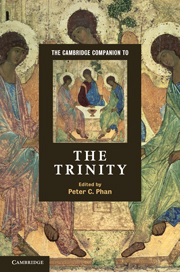Book contents
- Frontmatter
- Contents
- Notes on contributors
- Preface
- Part I Introduction
- Part II Retrieving the sources
- Part III Renewing the tradition
- Part IV Contemporary theologians
- Part V In dialogue with other religions
- 17 The Tao in Confucianism and Taoism: the Trinity in East Asian perspective
- 18 Trinity and Hinduism
- 19 Primordial Vow: reflections on the Holy Trinity in light of dialogue with Pure Land Buddhism
- 20 Trinity in Judaism and Islam
- Part VI Systematic connections
- Index
- References
20 - Trinity in Judaism and Islam
from Part V - In dialogue with other religions
Published online by Cambridge University Press: 28 July 2011
- Frontmatter
- Contents
- Notes on contributors
- Preface
- Part I Introduction
- Part II Retrieving the sources
- Part III Renewing the tradition
- Part IV Contemporary theologians
- Part V In dialogue with other religions
- 17 The Tao in Confucianism and Taoism: the Trinity in East Asian perspective
- 18 Trinity and Hinduism
- 19 Primordial Vow: reflections on the Holy Trinity in light of dialogue with Pure Land Buddhism
- 20 Trinity in Judaism and Islam
- Part VI Systematic connections
- Index
- References
Summary
For the soul, home is where prayer is, and a soul without prayer is a soul without a home.
Abraham Joshua HeschelLike living stones let yourselves be built on Christ as a spiritual house in the Spirit.
1 Peter 2:5Faith in divine unity [tawhîd] brings about insight [while] the state of trust in divine providence [tawakkul] will only be perfected by confidence in the trustworthy One.
Abu Hamîd al-GhazâliComparative theology is a fledgling discipline, taking its cue from Nostra aetate, its impetus from Karl Rahner's celebrated “world church” essay of 1979, and its form from recent practitioners like Frank Clooney. As a result, those who have been formed in traditional theology curricula, most of which bear the stamp of some form of “Christendom,” tend to see exercises in comparative theology as addenda to the “real thing,” a modish appendix to proper theology. The aim of this chapter is not so much to bring such critics up to date as to remind them how pervasive comparative efforts have been in shaping Christian theological tradition from the outset. What has altered radically has been the attitude that Christians take toward other faiths, as nearly all forms of Christianity have responded to the cue of Nostra aetate. It then becomes my task, in a volume dedicated to the uniquely Christian doctrine of “the Trinity,” to translate that profound change in attitude into a locus theologicus, a “clearing” in which we can delineate how alterations in attitude can inaugurate a fresh stage in the development of Christian theology, yet one quite continuous with its tradition. The theologian axial to this endeavor will be Bernard Lonergan, SJ, whose manner of displaying theological inquiry as “faith seeking understanding” will provide us with tools to carry out Rahner's impetus to theological renewal from “other faiths.” Often identified as “a theologian's theologian,” Lonergan devoted himself before, during, and after Vatican Council II to shaping a mode of thinking which could bring the ressourcement elaborated by the nouvelle théologie to a systematic focus, thereby showing us how to let theological attitudes disseminated in that council bear fruit in genuine developments in theology. Yet given the relentlessly philosophical quality of the inquiry he stimulated, his “influence” was inevitably more subterranean than evident, so one can understand his absence from the theologians treated in this volume, yet also welcome the opportunity an interfaith perspective provides to reclaim his signal role in trinitarian theology. All of this should help show how “comparative theology” can contribute to genuine development in Christian theology itself, perhaps because of the staunchly philosophical strategies it must employ to bridge between apparently fixed traditions, notably by showing how they have always been fluid, so that fixing them will betray them as traditions.
- Type
- Chapter
- Information
- The Cambridge Companion to the Trinity , pp. 344 - 362Publisher: Cambridge University PressPrint publication year: 2011
References
- 4
- Cited by



